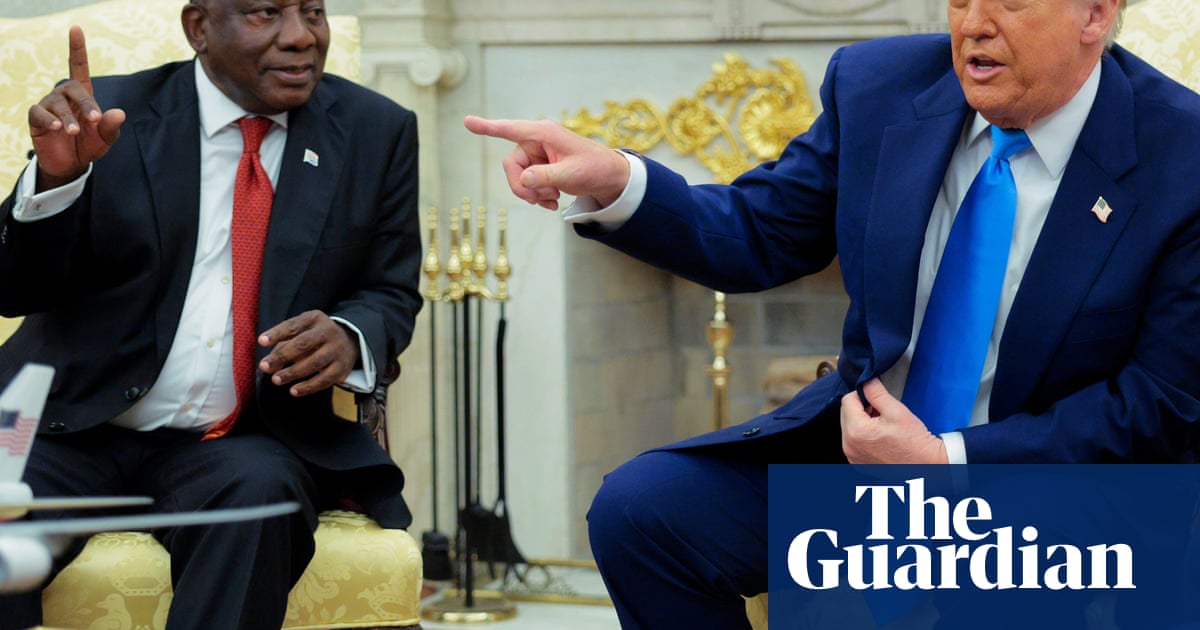Donald Trump has falsely claimed that Australia is being “inundated” with white South Africans who have fled their farms, repeating a baseless conspiracy theory that white people inSouth Africaare being systematically murdered and their land expropriated.
The US presidentheld a chaotic meeting with the South African president, Cyril Ramaphosa, in the Oval Office of the White House, during which played a video he falsely claimed proved “genocide” was being committed against white people in South Africa, under what he described as “the opposite of apartheid”.
Trump has long maintained that Afrikaners, a minority descended from mainly Dutch colonists who ruled South Africa during its decades of racial apartheid,are being persecuted. South Africa rejects the allegation. Murder and violent crime rates are high in the country but the overwhelming majority of victims are Black.
But Trump told Ramaphosa that white farmers were fleeing South Africa for the US and Australia.
“You’re taking people’s land and those people in many cases are being executed,” he said.
“They’re being executed. And they happen to be white, and most of them happen to be farmers.
“We have thousands of people who want to come into our country. They are also going to Australia, in smaller numbers.”
Trump later said vast numbers of white South African farmers were fleeing to Australia.
“You take a look at Australia – they’re being inundated, and we’re being inundated with people that want to get out, and their farm is valueless.”
The Guardian has put questions to Ausgtralia’s Department of Home Affairs.
The former home affairs minister Peter Dutton – who, as opposition leader, lost his seat in this month’s federal election –proposed a special humanitarian intake of white South African farmers in 2018.
The dedicated program would have been modelled on the 12,000 additional places for Syrian and Iraqi refugees displaced by the Syrian civil war and the conflict against Daesh.
Dutton said in 2018 that white South African farmers “deserve special attention” and “need help from a civilised country like ours”.
“I’ve asked the department to look at ways that we can provide some assistance. We could provide more visas for people potentially in the humanitarian program.”
The South African government said at the time “that threat does not exist” and the home affairs department did not implement any dedicated program for white South Africans.
South Africa is not in the top 10 of countries of origin for humanitarian entrants into Australia. Conflict-torn countries including Afghanistan, Iraq, Syria and Myanmar dominate that list.Australia’s South African-born population (not limited to humanitarian or refugee entrants) is the seventh-largest migrant community in Australia. It represents about 2.6% of Australia’s overseas-born population and 0.8% of Australia’s total population.
This year the US has started resettling white South Africans as refugees, with Trump saying Afrikaners were the victims of “genocide”.Fifty Afrikaners arrived in the US this month to take up Trump’s offer of “refuge”. He offered them asylum despite the US having halted arrivals of asylum seekers from most of the rest of the world as he dramatically limits immigration.
The US senator Chris Van Hollen accused the Trump administration of “making a mockery” of the country’s refugee process, turning it into a system of “global apartheid” by granting asylum status to Afrikaners while turning away refugees from war-torn countries, including Sudan.
On Wednesday US time, in the Oval Office, Ramaphosa pushed back against Trump’s statements, acknowledging South Africa’s high crime rate but stressing that most victims are Black.
As the meeting grew more chaotic and Trump’s tone more vociferous, Ramaphosa was resolutely calm.
“We were taught by Nelson Mandela that whenever there are problems, people need to sit down around the table and talk about them,” he said. “And this is precisely what we would also like to talk about.”
